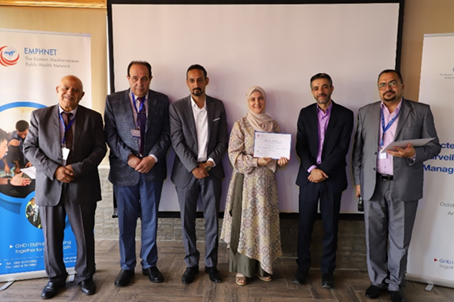Bacterial meningitis and septicemia are global public health challenges, particularly prevalent in our region. This disease, especially among infants and young children, remains a significant cause of morbidity and mortality. The Middle East and North Africa (MENA) countries have been facing endemic and epidemic outbreaks of meningococcal disease, yet there’s a striking scarcity of published data related to these regions. This information gap hinders the formulation of evidence-based decisions crucial for implementing effective vaccine intervention strategies.
Recognizing this need, EMPHNET, in collaboration with Sanofi, has spearheaded the establishment of the Meningitis and Septicemia Mapping Network (MenMap). This regional network aims to bolster the understanding and management of vaccine-preventable Invasive Bacterial Diseases (IBDs) in the Middle East, North Africa, and Eurasia. The project’s activities focus on research, surveillance, strengthening laboratory diagnosis capacities, and advancing public health policy to prevent, control, and treat bacterial meningitis and septicemia.
Key project activities include enhancing epidemiological surveillance, linking epidemiological and laboratory data, and hosting training sessions on bacterial meningitis surveillance, data management, and detection for healthcare professionals.
On March 5, 2024, as the MenMap project is currently operational in Egypt, Iraq, and Jordan, a Joint Meeting of the Steering and Scientific Committees along with the project’s First Quarterly meeting was held since its kickoff and the initiation of data collection. This meeting provided a space for participants to share updates on meningitis surveillance from their respective countries, review the project’s progress and milestones, address operational challenges, discuss future actions, and present the project’s dashboard and the yet-to-be-launched MenMap website.
The meeting was attended by the Head of the Network’s Steering Committee, the Head of the Scientific Committee, members of both committees, representatives of partner entities, country focal points, Sanofi representatives, and EMPHNET’s Disease Control and Prevention Team.
To provide updates on the progress of the project within the countries, the country focal points from Egypt, Iraq, and Jordan delivered reports detailing the status of meningitis surveillance from the inception of the project through February 2024. A comprehensive review of the project’s progress, milestones, and goals was presented. This was followed by a session for feedback and a discussion on addressing operational challenges, with attendees proposing solutions and best practices.
These updates highlight the concerted efforts across the region to monitor and respond to cases of meningitis, contributing valuable data toward the overarching goals of the MenMap project. They underscore the importance of ongoing surveillance, laboratory confirmation, and data collection in understanding the epidemiology of meningitis and septicemia to inform appropriate public health interventions.



